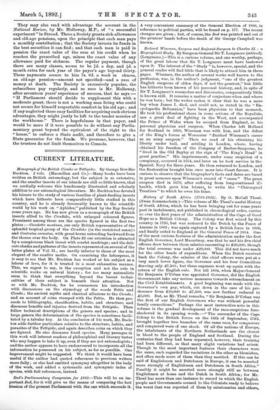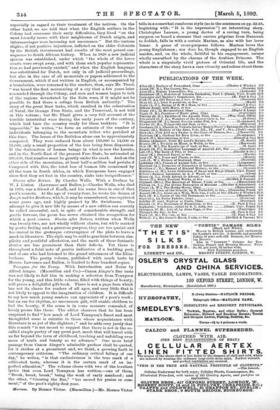History of South Africa (1795 - 1834). By G. McCall Theal. (Swan
Sonnenschein.)—This volume of Mr. Theal's useful History of South Africa, which he has been bringing out for some years past in instalments, not published in chronological order, carries us over the first years of the administration of the Cape of Good Hope as a British Colony. The Colony was first seized by this country in 1795, but was restored to the Dutch by the Peace of Amiens in 1803 ; was again captured by a British force in 1806, and finally ceded to England at the General Peace of 1814. One of the most curious features of the administration under the first English Governor, Lord Macartney, was that he and his five chief officers drew between them salaries amounting to £20,000, though the total revenue was under £29,000. This did not leave much for the other heads of expenditure. When the Dutch received back the Colony, the salaries of the chief officers were put at a very much lower figure, the Governor and his four Councillors drawing only £7,500; but these expenses went up again with the return of the English rule. Not till 1834, when Major-General Sir Benjamin D'Urban was appointed Governor, did the English Government take any serious measures towards retrenchment on the Civil Establishments. A good beginning was made with the Governor's own pay, which, cut down in the case of his pre- decessor from £10,000 to £7,500, was now further reduced to £5,000. But, as Mr. Theal remarks, " Sir Benjamin D' Urban was the first of our English Governors who was without powerful family connections." Perhaps the most instructive note in this volume is the gradual development of the race-suspicions fore- shadowed in its opening words :—" The surrender of the Cape Colony to the British forces on the 16th of September, 1795, brought together two branches of the same race, for conquerors and conquered were of one stock. Of all the nations of Europe, the inhabitants of the Northern Netherlands are the closest in blood to the people of England and Scotland. During the centuries that they had been separated, however, their training had been different, so that many slight variations had arisen. Though in the most important features their characters were the same, each regarded the variations in the other as blemishes, and often made more of them than they merited. If this can be said of Englishmen and Dutchmen in Europe, it can be asserted more strongly of Englishmen and Dutchmen in South Africa." Possibly it might be asserted more strongly still as between Englishmen at home and the Dutch in South Africa ; for Mr. Theal has more than one instance to record in which the English people and Governments seemed to the Colonists ready to believe the worst that was reported of them by missionaries and others,
especially in regard to their treatment of the natives. On the other hand, we are told that when the English settlers- in the Colony had overcome their early difficulties, they lived "on the most friendly terms with their neighbours of Dutch origin, and intermarriages were becoming not uncommon!' But the various slights, if not positive injustices, inflicted on the older Colonists by the British Government had results of the most potent con- sequence to South African history. When in 1828 a new judicial system was established, under which " the whole of the lower courts were swept away, and with them such popular representa- tion as had previously existed," and when the English language was substituted for Dutch, not only in all judicial proceedings, but also in the case of all memorials or papers addressed to the Government, which if not written in English, or accompanied by a translation, were returned to the senders, then, says Mr. Theal, " was heard the first murmuring of a cry that a few years later resounded through the Colony, and men and women began to talk of the regions devastated by the Zulu wars, if it might not be possible to find there a refuge from British authority." The story of the great Boer treks, which resulted in the colonisation of Natal, the Orange Free State, and the Transvaal, is not told in this volume ; but Mr. Theal gives a very full account of the terrible intertribal wars during the early years of the century, which laid bare the country ready for these trekkers. "It is impossible," he writes, "to form an estimate of the number of individuals belonging to the mountain tribes who perished at this time. The losses of the Batlokoa alone can be approximately computed. They were reduced from about 130,000 to 14,000 or 15,000, only a small proportion of the loss being from dispersion. If the destruction of human beings in what is now the Lesuto, and in the North-East of the present Free State, be estimated at 300,030, that number must be greatly under the mark. And on the other side of the mountains, at least half-a-million had perishe d Compared with this, the total loss of human life occasioned by all the wars in South Africa, in which Europeans have engaged since first they set foot in the country, sinks into insignificance."



































 Previous page
Previous page